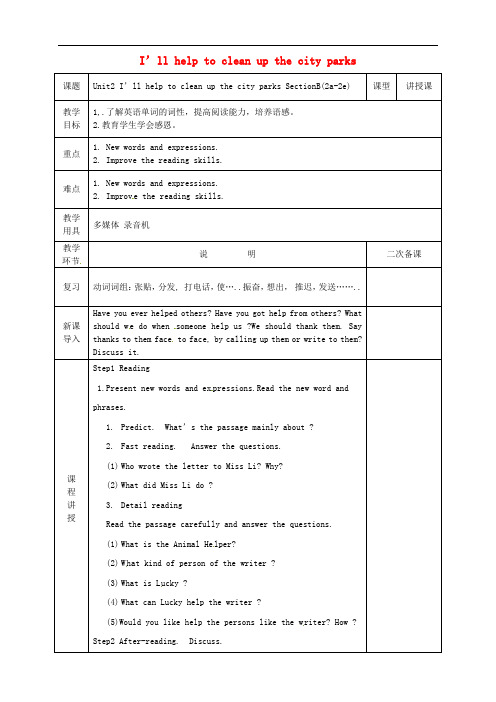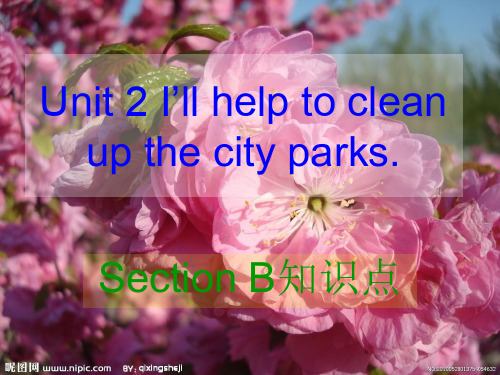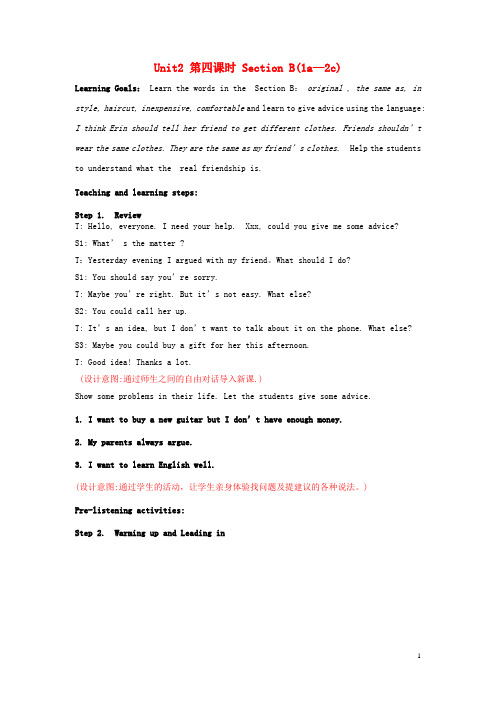2019年春八年级下unit2Section B 2
- 格式:ppt
- 大小:2.24 MB
- 文档页数:31










Unit2 第四课时 Section B(1a—2c)Learning Goals: Learn the words in the Section B: original , the same as, in style, haircut, inexpensive, comfortable and learn to give advice using the language: I think Erin should tell her friend to get different clothes. Friends shouldn’t wear the same clothes. They are the same as my friend’s clothes. Help the students to understand what the real friendship is.Teaching and learning steps:Step 1. ReviewT: Hello, everyone. I need your help. Xxx, could you give me some advice?S1: W hat’ s the matter ?T:Yesterday evening I argued with my friend。
What should I do?S1: You should say you’re sorry.T: Maybe you’re right. But i t’s not easy. What else?S2: You could call her up.T: It’s an idea, but I don’t want to talk about it on the phone. What else?S3: Maybe you could buy a gift for her this afternoon.T: Good idea! Thanks a lot.(设计意图:通过师生之间的自由对话导入新课.)Show some problems in their life. Let the students give some advice.1. I want to buy a new guitar but I don’t have enough money.2. My parents always argue.3. I want to learn English well.(设计意图:通过学生的活动,让学生亲身体验找问题及提建议的各种说法。

Unit 8 I’ll help clean up the city parks.(SectionB 2b) 教学设计该部分有四个模块:第一个模块围绕 ways in which you could help people这个话题展开叙述(1a),听力(1b),口语(1c)训练;第二个模块围绕 Talk about ways to tell people about the Clean-Up Day 进行听力(2a, 2b),口语(2c)训练;第三个模块是关于volunteers的一个阅读材料,训练形式为阅读(3a),填表格(3b),角色表演(3c);第四个模块仍以the kinds of work the volunteers do为话题,以表格及对话形式进行小组活动(4)。
Section B该部分有四个模块:第一模块是词汇的学习(1a)与运用(1b);第二个模块以听力训练形式强化第一模块中所学词汇(2a, 2b)和口语训练(2c);第三个模块围绕中心展开阅读(3a) a volunteer’s work 并再次强化了第一模块中的词汇学习(3b);第四模块仍就the work the volunteers do 这一话题以小组活动形式进行口语训练(4)。
Self check该部分有两个模块:第一模块对所学词汇进行填空训练(1);第二个模块以某一志愿者的活动为内容进行写作和口语练习(2)。
Reading该部分共设四项任务:第一项任务以问题讨论的形式激活相关的背景知识(Section 1);第二项任务要求学生通过快速阅读获取信息,并鼓励学生运用词性的知识阅读并理解短文内容(Section 2);第三项任务通过提炼阅读材料中的知识点和难点进一步理解文章(Section 3);第四项任务以写回信的形式对所学知识进行巩固运用(Section 4)。
2. 教材重组和课时分配Period 1: (Section A: 1a, 1b, 1c, 2a, 2b, 2c)New function presentingPeriod 2: (Section A: 3a, 3b, 3c, 4)PracticePeriod 3: (Section B: 1a, 1b, 2a, 2b, 2c, 3a, 3b, 4)Integrating skillsPeriod 4: (Section 1-Section 4)ReadingPeriod 5: (Self check: 1, 2)Self checkIII. Teaching plans for each period分课时教案Period 1 New function presentingLanguage goals语言目标1. Words & expressions生词和短语clean up, hunger, homeless, cheer up, give out, clean-up, sign, put off, set up, establish, major, commitment, veterinarian, coach2. Key sentences重点句子I’d like to work outside.You could help clean up the city parks.Ability goals能力目标Enable the Ss to talk about offering help.Enable the Ss to talk about the Clean-Up Day.Emotion & attitude goals情感和态度目标Enable the Ss to form a positive attitude to help others.Strategy goals策略目标To understand the target language by reading the pictures.Culture awareness goals 文化意识目标Being a volunteer is great!How to offer help to others.Teaching important points 教学重点Enable the Ss to talk about offering help.Teaching procedures and ways教学过程与方式Step I Lead-inT: In the last unit, we have learned “where would you like to visit”. If you asked me this question, I would say: I would like to visit Guilin. It is the place which I would like to visit most. Would you like to visit it?Ss: Yes. We would also like to visit it because of its beautiful scenery and kind people. T: Good. There are many tourist attractions in Guilin, so every year thousands of people visit it. But there are many visitors who throw waste cans and plastic bags here and there. As a result, many tourist attractions in Guilin have been polluted heavily. And the same thing has happened in other places all over the country. It is reported that an old woman from America helped clean up rubbish thrown by visitors on the Great Wall as a volunteer. And in our country there are many volunteers to do every kind of work to help others. Do you think being a volunteer is great?Ss: Yes, we have heard of many good deeds done by volunteers all over the country. They are great. They give people help without hope of reward.T: Then do you hope to become volunteers?Ss: Yes, we hope to become volunteers, thus, we can help many people who need help. T: I suggest you set up a volunteer group to try your best to help people. Now please open your books and turn to page 60. Look at the picture. What can you see in it? Ss: The two persons are talking about volunteer work.T: Good, please read the three posters in it. Who would like to read them to us?S1: Let me try. The first poster: Help clean up the city parks; The second: Visit sick children in the hospital; The third: Help stop hunger.T: Thank you. Besides the ways provided in the posters to help people, can you think of more other ways?S2: Help people stop smoking.S3: Help people keep away from drugs.S4: Visit old people in the old people’s house.T: There are some pictures about disabled people? What’s wrong with him?S1: He is blind.S2: He can’t use his legs.……T: Now let’s watch a video. (about a guide dog)What animal can help disabled people?Step II Ⅱ.Reading comprehension1. Who wrote the letter to Miss Li? Why?2. What did Miss Li do?1. The writer can’t use his arms or legs well.2. Lucky was brought to the writer by his friend.3. They have been trained at “Animal helpers”for seven months.4. A dog-helper is for those who are disabled.5. Lucky can understand different orders.1.What was Animal Helpers set up to do?2.What’s wrong with Ben Smith?3.What difficulties does Ben Smith have?4.Where does the dog come from?5.Why is his name Lucky?6.Can Lucky understand the writer when he gives him orders? Step III Consolidation1.为…而感谢2.为帮助残疾人而建立3.使得某人做某事成为可能4.对…产生影响;有作用5.考虑6.正常的事情7. 搬东西8. 对某人来说很困难9. 我的一位朋友10. 帮…摆脱困境11. 一只经过特殊训练的狗12. 振奋起来13.对…感到兴奋14.六个月的训练15.因为你的仁慈16.改变某人的生活StepⅣ. Extension1.Challenge masters2.Ben Smith thanks Miss Li for ______ (give) money to Animal Helpers, a groupthat helps ________(disable) people like Ben. Ben can’t do ma ny n______things like answering the telephone, opening and closing doors, or ________ (carry) things. Lucky is a special _______(train) dog. He can help many d_______people live more________(happy). Lucky is smart and can u__________ many English words. Lu cky makes a big d _________ to Ben’s life. He is helping toc______Ben’s life for the better.stepⅤ. SummarizeWords:imagine, disabled, difficulty, normal, kindness, difference, train, excited Phrases:set up, make a difference, be excited aboutSentences:1.This group was set up to help disabled people.2.you helped to make it possible for me to have Lucky.3.Lucky makes a big difference to my life.4.A friend of mine helped me out.5.She talked to Animal Helpers about getting me a special trained dog.6. Normal things like answering the telephone, opening and closing doors or carrying things are difficult for me.。

Section B1a1. But my mother wants me to drink it. 但我妈妈想让我喝它。
(教材第12页)want sb. to do sth. 意为“想让某人做某事”,否定形式为want sb. not to do sth. 意为“不想让某人做某事”。
Eg:She wants me to bring him some pens. 她想让我给她带些钢笔。
拓展:1.want sth. 想要某物Do you want any story books?你想要些故事书吗?2.want to do sth. 想要做某事I want to visit my uncle. 我想去看望我的叔叔。
Do you want (tell)me anything?2. She says it’s good for my health. 她说它对我的健康有好处。
(教材第12页)be good for 意为“对……有益”。
反义词为be bad for “对……有害”。
Eg: Vegetables are good for you. 蔬菜对你有好处。
拓展:be good at 擅长... be good at doing sth. 擅长做...I am good at (play)basketball.①Doing sports can help us keep ___________(health)②They eat very ____________(health).③Mike is good for our ____________(health).( ) ④ I think eating more _____ food can help us keep _____.A. health; healthyB. healthy ; healthC. healthy; healthy2b3. Last month we asked our students about their free time activities. 上个月我们向学生询问了他们业余活动的情况。
